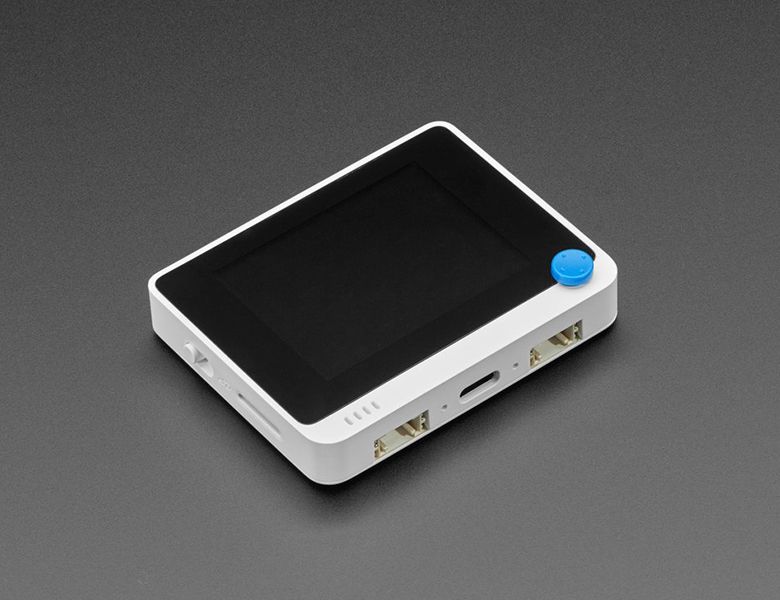
Seeeduino Wio Terminal by Seeed Studio
Instead of being a single embedded functional module, Wio Terminal is more of a complete system equipped with Screen + Development Board + Input/Output Interface + Enclosure. Because it uses the SAMD51, it is compatible with Arduino and CircuitPython - using the same Arduino & CircuitPython core we have developed here at Adafruit!
Wio Terminal is an ATSAMD51-based microcontroller with wireless connectivity supported by Realtek RTL8720DN. Its CPU speed runs at 120MHz (boost up to 200MHz). Realtek RTL8720DN chip supports both Bluetooth and Wi-Fi providing the backbone for IoT projects. The Wio Terminal itself is equipped with a 2.4” LCD Screen, onboard accelerometer (LIS3DHTR), microphone, buzzer, microSD card slot, light sensor, and infrared emitter (IR 940nm). On top of that, it also has two x JST PH 4-pin STEMMA / Grove ports for Grove Ecosystem and 40-pin compatible GPIO for more Raspberry Pi add-ons.
Highly Integrated Design
- MCU, LCD, WIFI, BT, IMU, Microphone, Buzzer, microSD Card, Configurable Buttons, Light Sensor, 5-Way Switch, Infrared Emitter (IR 940nm), Crypto-authentication Ready
- Well-designed enclosure with built-in magnets and two mounting holes, allowing you to set up your IoT project without hassle
Powerful MCU - Microchip ATSAMD51P19
- ARM Cortex-M4F core running at 120MHz using Adafruit core support for Arduino and CircuitPython
- 4 MB External Flash, 192 KB RAM
- Comprehensive Protocol Support
- SPI, I2C, I2S, ADC, DAC, PWM, UART(Serial)
- Built-in real-time clock RTC
Reliable Wireless Connectivity
- Powered by Realtek RTL8720DN
- Dual Band 2.4Ghz / 5Ghz Wi-Fi (802.11 a/b/g/n)
- BLE / BLE 5.0
USB OTG Support
- Accessible Devices (as USB-Host): read data or signals from a mouse, keyboard, MIDI devices, Xbox/PS gaming controllers, 3D printers
- Simulated Devices (as USB-Client): emulate a mouse, keyboard or MIDI devices to Host PC
- When using USB Host/Client function, you can use the 40-pin on the back of Wio Terminal for power supply. Check here for detailed instructions.
External Sensor Ports
- Two onboard multi-functional Grove ports can be used for Digital, Analog, I2C, and PWM
- To connect STEMMA QT sensors with Wio Terminal, please use a JST PH 4-pin STEMMA / Grove cable.
Raspberry Pi 40-pin Compatible
- Can be mounted to a Raspberry Pi as a slave device
- Raspberry Pi’s HAT can be used with an adapter cable
Software Support
- Arduino based on Adafruit SAMD51 core
- Adafruit CircuitPython (How to run CircuitPython on Wio Terminal?)
- ArduPy
- AT Firmware
- Visual Studio Code
NOTE: The RTL8720DN isn’t supported from CircuitPython. Therefore, Wifi and Bluetooth will not work.
Purchase
Contribute
Have some info to add for this board? Edit the source for this page here.
CircuitPython 9.2.8
This is the latest stable release of CircuitPython that will work with the Seeeduino Wio Terminal. Use this release if you are new to CircuitPython.
Modules included in this download
_asyncio _bleio _pixelmap adafruit_bus_device adafruit_pixelbuf aesio alarm analogio array atexit audiobusio audiocore audioio audiomixer audiomp3 binascii bitbangio bitmaptools board builtins builtins.pow3 busdisplay busio busio.SPI busio.UART codeop collections countio digitalio displayio epaperdisplay errno fontio fourwire frequencyio getpass gifio i2cdisplaybus i2ctarget io jpegio json keypad keypad.KeyMatrix keypad.Keys keypad.ShiftRegisterKeys locale math microcontroller msgpack neopixel_write nvm onewireio os os.getenv paralleldisplaybus ps2io pulseio pwmio rainbowio random re rotaryio rtc samd sdcardio select spitarget storage struct supervisor sys terminalio tilepalettemapper time touchio traceback ulab usb_cdc usb_hid usb_midi vectorio warnings watchdog zlibCircuitPython 10.0.0-alpha.7
This is the latest development release of CircuitPython that will work with the Seeeduino Wio Terminal.
Alpha development releases are early releases. They are unfinished, are likely to have bugs, and the features they provide may change. Beta releases may have some bugs and unfinished features, but should be suitable for many uses. A Release Candidate (rc) release is considered done and will become the next stable release, assuming no further issues are found.
Please try alpha, beta, and rc releases if you are able. Your testing is invaluable: it helps us uncover and find issues quickly.
Release Notes for 10.0.0-alpha.7
Modules included in this download
_asyncio _bleio _bleio (HCI co-processor) _pixelmap adafruit_bus_device adafruit_pixelbuf aesio alarm analogio array atexit audiobusio audiocore audioio audiomixer audiomp3 binascii bitbangio bitmaptools board builtins builtins.pow3 busdisplay busio busio.SPI busio.UART codeop collections countio digitalio displayio epaperdisplay errno fontio fourwire frequencyio getpass gifio i2cdisplaybus i2ctarget io jpegio json keypad keypad.KeyMatrix keypad.Keys keypad.ShiftRegisterKeys locale math microcontroller msgpack neopixel_write nvm onewireio os os.getenv paralleldisplaybus ps2io pulseio pwmio rainbowio random re rotaryio rtc samd sdcardio select spitarget storage struct supervisor sys terminalio tilepalettemapper time touchio traceback ulab usb_cdc usb_hid usb_midi vectorio warnings watchdog zlibAbsolute Newest
Every time we commit new code to CircuitPython we automatically build binaries for each board and language. The binaries are stored on Amazon S3, organized by board, and then by language. These releases are even newer than the development release listed above. Try them if you want the absolute latest and are feeling daring or want to see if a problem has been fixed.
Previous Versions of CircuitPython
All previous releases of CircuitPython are available for download from Amazon S3 through the button below. For very old releases, look in the OLD/ folder for each board. Release notes for each release are available at GitHub button below.
Older releases are useful for testing if you something appears to be broken in a newer release but used to work, or if you have older code that depends on features only available in an older release. Otherwise we recommend using the latest stable release.
